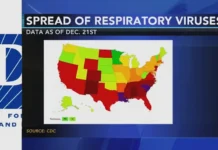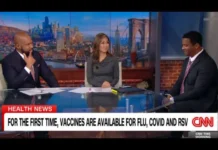
By Maggie Fox, Jamie Gumbrecht and Jacqueline Howard, CNN
(CNN) — Vaccine advisers to the U.S. Food and Drug Administration started meeting Friday morning to discuss whether many Americans need to start getting booster doses of coronavirus vaccine.
The all-day meeting will be packed with presentations. They’ll include Pfizer/BioNTech, which is arguing that there’s enough evidence of waning immunity to justify giving booster doses to people. The FDA will present its own take on the data that’s been sent to the agency so far — although written briefing materials published before the meeting suggest the agency is remaining neutral for the time being.
The Vaccines and Related Biological Products Advisory Committee is made up of vaccine experts, immunologists, pediatricians, infectious disease specialists and public health experts.
They’ll hear first from Dr. Peter Marks, who heads the FDA’s vaccine arm, the Center for Biologics Evaluation and Research. Another CBER official, Marion Gruber, will lay out the question at hand. It’s a routine presentation, but Gruber announced her retirement only a few weeks ago amid speculation that she was stepping down to protest White House involvement in the booster decision.
Gruber also, very unusually, signed a Lancet paper published earlier this week that argued it’s too soon to start giving people boosters.
Experts at the U.S. Centers for Disease Control and Prevention will detail what’s known about how the Delta variant affects the rate of breakthrough infections. Researchers from the UK and Israel will present some real-world data about how many fully vaccinated people have become infected anyway, and whether giving boosters has lowered that rate of breakthroughs.
The meeting, which will be streamed online, is expected to last until 4:45 p.m. ET or later, with a period for discussion and vote scheduled to start at 2:25 p.m. and to last at least two hours.
Pfizer received full approval for its vaccine from the FDA, so the request to add a booster dose is a supplement to that approval. The data being presented by Pfizer involves a booster given to its volunteers about six months after they finished their first two doses.
Pfizer — and other researchers — say their studies show people develop strong immunity after two doses of vaccine, but that levels of antibodies start to drop after a few months.
“Concerns have been raised that declining neutralizing antibody titers or reduced effectiveness against symptomatic disease may herald significant declines in effectiveness against severe disease,” the FDA says in its briefing document.
“The recent emergence of the highly transmissible Delta variant of SARS-CoV-2 resulted in a new wave of COVID-19 cases in many parts of the world and has led to considerations for administration of booster doses to individuals who received primary series of vaccines in an effort to enhance immunity, and thus sustain protection from COVID-19. The expected benefit of booster vaccination will depend on the impact that booster vaccination has in reducing disease relative to the primary series.”
The FDA notes that Pfizer’s vaccine — as well as vaccines made by Moderna and Johnson & Johnson — still provide strong protection against severe disease, hospitalization and death, even if antibodies do wane over time.
FDA asked Pfizer to do more analysis of new Covid-19 cases diagnosed in July and August, when the Delta variant became dominant and after vaccinated people’s immunity could have been expected to have waned. The analysis showed the incidence of infection among people fully vaccinated 10 months before was 70.3 cases per 1,000 person-years, compared with 51.6 cases per 1,000 person-years among people who had been vaccinated five months before.
But there were only three cases of severe disease.
Pfizer argues this demonstrates waning immunity. “As the Delta variant has become widely disseminated, rates of COVID-19 are again on the rise in the United States and across the world,” the company says it its briefing document submitted to FDA.
“Although unvaccinated individuals continue to account for most SARS-CoV-2 infections and severe cases of COVID-19, real-world data suggest that rates of breakthrough infections may be on the rise and that vaccine effectiveness may be waning over time.”
The question will be whether it’s time to start approving boosters now and if so, who should get them and when.
The White House has said it’s planning to be ready to start giving booster doses of vaccines September 20, pending signoff from the FDA and CDC.
The CDC has scheduled a meeting of its vaccine advisers for September 22 and 23 — and CDC must give its stamp of approval for any booster doses to be officially given. ‘
Third doses are already approved for certain immunocompromised people, but not for the general public.
The-CNN-Wire
™ & © 2021 Cable News Network, Inc., a WarnerMedia Company. All rights reserved.















